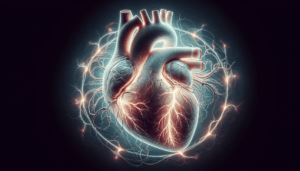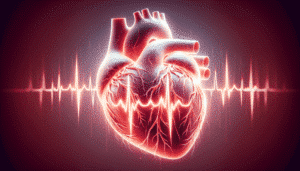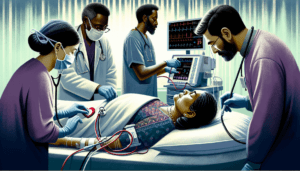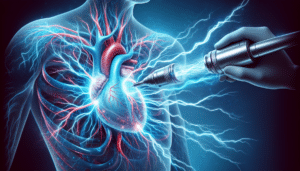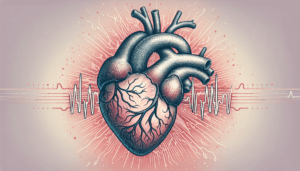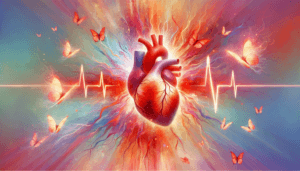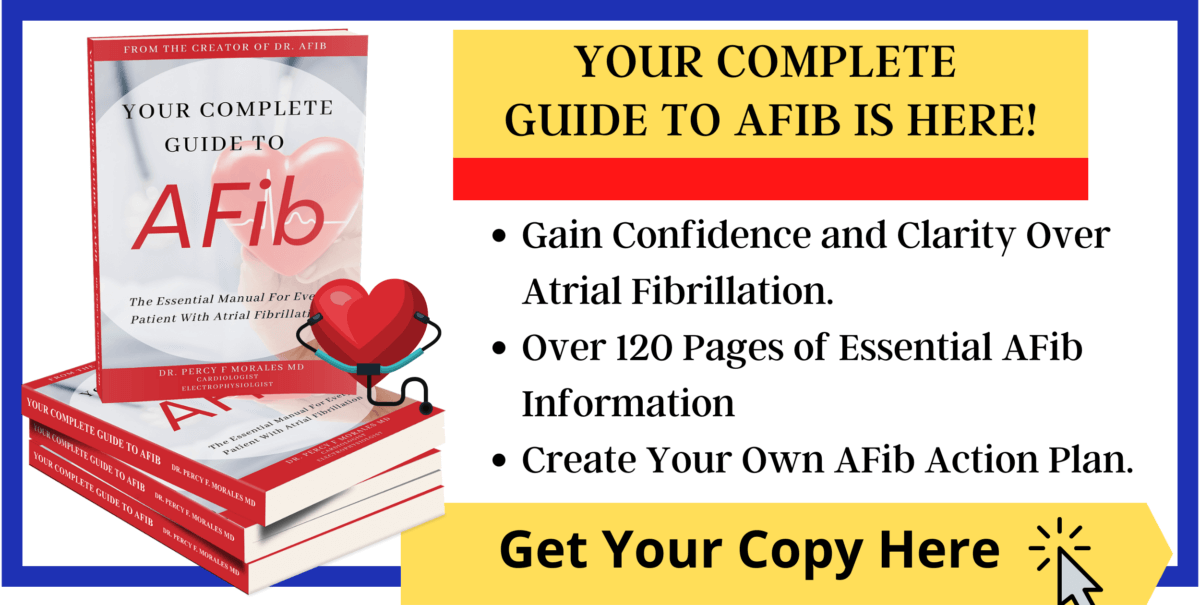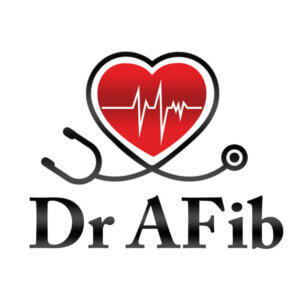Read more about heart palpitations at night in this article. Picture this: You’re lying in bed after a long day, ready for a good night’s rest, when suddenly, you feel a strange sensation in your chest. Your heart seems to be pounding, racing, or even skipping beats. This can be quite alarming, and you may wonder what’s happening. This could be a sign of heart palpitations at night. In this blog post, we’ll explore the symptoms, causes, and treatments of this unnerving phenomenon, so you can be better equipped to handle it if it strikes during your slumber.
Key Takeaways
Nighttime heart palpitations may be caused by medical conditions, lifestyle habits, and temporary physical states.
Identifying the causes of heart palpitations at night is essential in order to determine the most effective treatment and prevention methods.
It is important to seek medical advice if experiencing frequent nighttime heart palpitations along with other serious symptoms.
Understanding Heart Palpitations at night
Heart palpitations refer to the sensation of one’s heart beating irregularly, too quickly, or too forcefully, which can be an indication of an abnormal heart rhythm. While these sensations can happen anytime, heart palpitations happen to be often more noticeable at night as people tend to be less distracted, sitting still or reclining. The reduced level of distractions and noise when preparing for sleep may make one more cognizant of their heartbeat, leading to night heart palpitations.
Although they can be concerning, frequent heart palpitations are generally not indicative of an underlying health issue. However, only proper testing from your doctor can determine if heart palpitations at night are signs of a more serious health issue.
Factors Influencing Nighttime Palpitations
There are several factors that may influence nighttime palpitations, such as medical conditions, lifestyle habits, and temporary physical states. Medical conditions that may cause heart palpitations at night include heart disease, anemia, and an overactive thyroid. Lifestyle habits like alcohol consumption, caffeine intake, nicotine use, stress, and hormonal changes can also contribute to nighttime heart palpitations.
On the other hand, temporary physical states such as dehydration, certain sleep positions, and hormonal changes during pregnancy may also be responsible for nighttime heart palpitations. Gaining awareness of these factors helps in understanding and managing heart palpitations at night.
Common Symptoms
The typical indications of heart palpitations during the night include a pounding, racing, or irregular heartbeat. Some might also experience a sensation of their heart fluttering or missing a beat, and even feel lightheaded or dizzy. Familiarity with these symptoms allows for quick identification and addressing of the issue if it occurs during your sleep.
Remember, although heart palpitations can be distressing, they are may not indicative of a serious health issue. However, only proper testing from your doctor can determine if heart palpitations at night are signs of a more serious health issue. Utilizing relaxation techniques can help calm heart palpitations and alleviate the anxiety that may accompany them.
Your Complete Guide To AFib: The Essential Manual For Every Patient With Atrial Fibrillation
Identifying Causes of Heart Palpitations at Night
Diagnosing the cause of heart palpitations is crucial to determine the correct treatment and prevention methods. Various factors can lead to heart palpitations, including medical conditions, lifestyle habits, and temporary physical states.
Once the causes of heart palpitations at night are identified, appropriate measures can be taken to manage and prevent their occurrence. For example, if stress is a trigger, implementing relaxation techniques and stress management practices can help reduce the frequency of palpitations.
Medical Conditions
Several medical conditions that can cause nighttime heart palpitations include:
Heart disease
Arrhythmias
Anemia
Thyroid disease
Metabolic syndrome
Overactive thyroid
These underlying health issues should be taken into account when experiencing heart palpitations at night.
If you notice heart palpitations accompanied by other symptoms such as:
shortness of breath
fainting
accompanying chest pain
feeling lightheaded
It’s crucial to seek medical attention. A healthcare professional will assess your symptoms and determine if the palpitations are a result of an underlying medical condition that requires treatment or testing.
Cardiac Reasons for Heart Palpitations at Night
There are several heart rhythm abnormalities that can cause nighttime heart palpitations. These include:
Sinus Tachycardia: This is a condition where the sinus node in the heart, which is responsible for setting the pace of your heartbeat, sends out electrical signals faster than usual. This leads to a faster heart rate, which can be felt as heart palpitations. Sinus tachycardia can be caused by several factors, including stress, anxiety, physical exertion, certain medications, and some medical conditions.
Premature Atrial Complexes (PACs): PACs are early beats that originate in the atria (the upper chambers of the heart). They are common and can occur in healthy individuals. You might feel PACs as a skipping sensation or feel like your heart is “jumping.” They are often harmless but can sometimes lead to more serious heart rhythm disorders.
Premature Ventricular Complexes (PVCs): PVCs are early beats that originate in the ventricles (the lower chambers of the heart). Like PACs, they can be felt as a skip or jump in the heartbeat. While they can be caused by heart disease and certain medications, they can also occur in healthy individuals. PVCs are usually benign, but frequent PVCs may require medical evaluation.
Atrial Fibrillation: This is a common type of irregular heartbeat, or arrhythmia, where the heart beats too fast and irregularly. It occurs when the two upper chambers of the heart, the atria, beat chaotically and out of coordination with the two lower chambers, the ventricles. This can lead to blood pooling in the atria, increasing the risk of blood clots, stroke, heart failure, and other heart-related complications. Atrial fibrillation can cause symptoms like heart palpitations, shortness of breath, and weakness.
Lifestyle Habits
Lifestyle habits can also contribute to heart palpitations at night. Some examples include:
Consuming alcohol, caffeine, or nicotine close to bed time, as these substances act as stimulants and increase one’s heart rate
Experiencing stress, which can lead to palpitations
Having a poor diet, which can result in nutritional deficiencies that can induce heart palpitations
Addressing these lifestyle habits by reducing caffeine and alcohol intake, managing stress levels, and adhering to a nutritious diet can help reduce the occurrence of heart palpitations at night. Examining daily habits and making necessary adjustments can help prevent the discomfort of nighttime heart palpitations.
Temporary Physical States
Temporary physical states, such as dehydration, certain sleep positions, and pregnancy, may also be responsible for nighttime heart palpitations. For example, lying on the left side may put pressure on the chest and impede blood flow, which may result in palpitations.
To prevent heart palpitations caused by temporary physical states, ensure you stay well-hydrated, avoid lying on your left side, and maintain a healthy lifestyle during pregnancy. Addressing these factors can lower the odds of experiencing heart palpitations at night.
Diagnosis and Evaluation of Nighttime Heart Palpitations
Diagnosing nighttime heart palpitations typically involves a physical examination, an electrocardiogram (ECG), and additional diagnostic tests such as a Holter monitor. A healthcare professional will assess your medical history, conduct a physical exam, and listen to your heart using a stethoscope to determine the cause of the palpitations.
If necessary, further tests that may be conducted to identify any potential underlying health conditions or triggers that may be causing the palpitations include:
ECG (electrocardiogram)
Echocardiogram
Stress test
Holter monitor
Consulting a healthcare professional for an accurate diagnosis and treatment is crucial.
KardiaMobile 6-Lead Personal EKG Monitor – Six Views of The Heart – Detects AFib and Irregular Arrhythmias – Instant Results in 30 Seconds – Works with Most Smartphones – FSA/HSA Eligible
13% OffPhysical Examination
During a physical examination for diagnosing nighttime heart palpitations, the physician will assess the following:
Pulse
Blood pressure
Blood oxygen saturation
Temperature
Listening to your heart for any irregular sounds
The doctor should also ask about the patient’s palpitations – how often and for how long. They should investigate if anything causes the palpitations to become worse, such as caffeine, stress, alcohol, or certain foods.
Maintaining a journal of these occurrences may aid your physician in ascertaining the origin of your heart palpitations. This information, along with the results of the physical examination, will help the healthcare professional determine the cause of the palpitations and recommend appropriate treatment.
Electrocardiogram (ECG)
An electrocardiogram (ECG) is a standard test employed to observe the electrical activity of the heart, including during nocturnal heart palpitations. The ECG can help diagnose and analyze the root cause of palpitations by detecting any discrepancies in the heart’s rhythm or structure.
However, in some cases, an ECG may not capture the irregular activity causing the palpitations. In such instances, an extended monitor may be needed to detect unusual activity over a more extended period.
Additional Diagnostic Tests
Apart from the physical examination and ECG, additional diagnostic tests may be conducted to determine if heart palpitations are related to underlying health concerns. These tests may include:
Blood tests
Echocardiograms
Stress tests
Holter monitors
A Holter monitor study is especially important during palpitations at night, since extended heart monitoring is more likely to catch any symptoms or irregular heart beats that may not be present all the time.
These tests can help identify potential underlying health conditions or triggers that may be causing the palpitations.
Undergoing these additional diagnostic tests aids in understanding the cause of nighttime heart palpitations, enabling you to develop an appropriate treatment plan with your healthcare professional, thereby ensuring a more peaceful night’s sleep.
Managing and Preventing Nighttime Heart Palpitations
Managing and preventing nighttime heart palpitations can involve lifestyle changes, relaxation techniques, and sleeping position adjustments. By implementing these strategies, you can reduce the frequency of palpitations and improve your overall quality of sleep.
While these methods can help manage and prevent heart palpitations, consulting with a healthcare professional becomes necessary if palpitations persist or are accompanied by other serious symptoms.
Lifestyle Changes
Lifestyle changes can play a significant role in preventing nighttime heart palpitations. Here are some tips to consider:
Reduce caffeine and alcohol intake
Manage stress levels
Maintain a healthy diet
Engage in regular exercise
These changes can help reduce the occurrence of heart palpitations at night and improve overall health.
Relaxation Techniques
Relaxation techniques are activities that can help reduce stress and anxiety, and can be used to assist with calming heart palpitations at night. These techniques include:
Controlled breathing
Progressive muscle relaxation
Guided imagery
Meditation
Practicing relaxation techniques regularly can help relieve heart palpitations, including an accelerated heart rate and chest constriction. Moreover, they can alleviate the psychological components, including anxiety and fear, that may accompany heart palpitations.
Sleeping Position Adjustments
Sleeping position can influence the prevalence of heart palpitations, as certain positions may compress the chest and impede the circulation of blood. To prevent heart palpitations caused by sleeping positions, it is advisable to avoid lying on your left side, as this can put pressure on the chest and impede blood flow.
Instead, try sleeping on your right side or on your back to minimize the likelihood of experiencing heart palpitations at night. Addressing these factors can lessen the chances of experiencing heart palpitations during sleep, leading to a more peaceful night’s rest.
Treatment Options for Nighttime Heart Palpitations
If you continue to experience nighttime heart palpitations, treatment options are available, including medications and non-pharmacological interventions. The appropriate treatment will depend on the underlying cause of the palpitations, as determined by your doctor.
Working closely with your healthcare provider to develop a tailored treatment plan that addresses the root cause of your heart palpitations is essential for achieving a more restful night’s sleep.
Medications
Depending on the underlying cause of your heart palpitations, medications may be prescribed to help manage the condition. These medications can include anti-arrhythmic drugs, beta blockers, and calcium channel blockers, which are commonly used to treat nighttime heart palpitations.
Consulting with a healthcare professional for an accurate diagnosis and treatment is crucial as they can recommend the most suitable medication for your specific situation.
Non-Pharmacological Interventions
Non-pharmacological interventions that can help address the root cause of heart palpitations at night include:
Therapy for anxiety
Stress management techniques
Lifestyle modifications such as implementing relaxation techniques, consuming a nutritious diet, and engaging in regular exercise.
Adopting these non-pharmacological interventions enables effective management and prevention of nighttime heart palpitations, leading to a more restful and undisturbed night’s sleep.
When to Seek Medical Attention
Seeking medical attention becomes vital if experiencing frequent heart palpitations, especially nighttime heart palpitations potentially caused by atrial fibrillation or low blood sugar, are accompanied by other serious symptoms, such as shortness of breath, fainting, chest pain, or feeling lightheaded.
Additionally, if palpitations persist despite implementing lifestyle changes and relaxation techniques, it’s important to consult with a healthcare professional. By seeking medical advice, you can ensure that any underlying health issues are identified and addressed, allowing you to receive the appropriate treatment and ultimately achieve a more peaceful night’s sleep.
Summary
In conclusion, nighttime heart palpitations can be a distressing experience, but understanding their symptoms, causes, and treatments can help you manage and prevent their occurrence. By implementing lifestyle changes, relaxation techniques, and adjusting your sleeping position, you can minimize the likelihood of experiencing heart palpitations at night. Additionally, seeking medical advice when necessary ensures that any underlying health issues are addressed, and proper treatment is provided.
Remember, a peaceful night’s sleep is within your reach. By following the strategies outlined in this blog post, you can take control of your nighttime heart palpitations and enjoy the restful sleep you deserve.
Frequently Asked Questions
Why do I get heart palpitations at night?
Heart palpitations at night may be caused by health conditions such as abnormal heart rhythm, low blood sugar, low blood pressure, sleep positions, dehydration and not getting the proper nutrition. Additionally, certain lifestyle factors such as alcohol, caffeine, nicotine, stress or hormones can cause them.
When should I worry about heart palpitations?
If you are experiencing severe symptoms with palpitations, such as chest pain, fainting, severe shortness of breath, or prolonged episodes of palpitations, it is important to seek medical attention quickly from your doctor.
What are the common symptoms of nighttime heart palpitations?
Nighttime heart palpitations often present as a pounding, racing, or irregular heartbeat, as well as a fluttering or missing beat sensation.
How can I manage and prevent nighttime heart palpitations?
Making lifestyle changes, using relaxation techniques, and adjusting sleeping position can help manage and prevent nighttime heart palpitations.
The Best Atrial Fibrillation Book
Your Complete Guide To AFib: The Essential Manual For Every Patient With Atrial Fibrillation

Shop AFib Products on Amazon
KardiaMobile 6-Lead Personal EKG Monitor – Six Views of The Heart – Detects AFib and Irregular Arrhythmias – Instant Results in 30 Seconds – Works with Most Smartphones - FSA/HSA Eligible
13% Off
KardiaMobile 1-Lead Personal EKG Monitor – Record EKGs at Home – Detects AFib and Irregular Arrhythmias – Instant Results in 30 Seconds – Easy to Use – Works with Most Smartphones - FSA/HSA Eligible
$79.00 (as of June 9, 2025 07:03 GMT -06:00 - More infoProduct prices and availability are accurate as of the date/time indicated and are subject to change. Any price and availability information displayed on [relevant Amazon Site(s), as applicable] at the time of purchase will apply to the purchase of this product.)
Apple Watch Series 9 [GPS 41mm] Smartwatch with Storm Blue Aluminum Case with Silver Sport Band M/L. Fitness Tracker, Blood Oxygen & ECG Apps, Always-On Retina Display
(as of June 9, 2025 08:03 GMT -06:00 - More infoProduct prices and availability are accurate as of the date/time indicated and are subject to change. Any price and availability information displayed on [relevant Amazon Site(s), as applicable] at the time of purchase will apply to the purchase of this product.)
Fitbit Sense 2 Advanced Health and Fitness Smartwatch with Tools to Manage Stress and Sleep, ECG App, SpO2, 24/7 Heart Rate and GPS, Shadow Grey/Graphite, One Size (S & L Bands Included)
20% Off
OMRON 2-in-1 Upper Arm Blood Pressure Monitor & 1-Lead EKG Monitor - Clinically Validated Blood Pressure Arm Cuff & Machine - Use OMRON Connect App
17% Off
Samsung Galaxy Watch 6 44mm Bluetooth Smartwatch, Fitness Tracker, Personalized HR Zones, Advanced Sleep Coaching, Heart Monitor, BIA Sensor, Health Wellness Insights, Big Screen, US Version, Graphite
52% Off $329.99 (as of June 9, 2025 07:03 GMT -06:00 - More infoProduct prices and availability are accurate as of the date/time indicated and are subject to change. Any price and availability information displayed on [relevant Amazon Site(s), as applicable] at the time of purchase will apply to the purchase of this product.)
Natural Rhythm Triple Calm Magnesium 150 mg - 120 Capsules – Magnesium Complex Compound Supplement with Magnesium Glycinate, Malate, and Taurate. Calming Blend for Promoting Rest and Relaxation.
$20.77 ($0.17 / Count) (as of June 9, 2025 07:03 GMT -06:00 - More infoProduct prices and availability are accurate as of the date/time indicated and are subject to change. Any price and availability information displayed on [relevant Amazon Site(s), as applicable] at the time of purchase will apply to the purchase of this product.)
Pure Encapsulations Magnesium (Glycinate) - Supplement to Support Stress Relief, Sleep, Heart Health, Nerves, Muscles, and Metabolism* - with Magnesium Glycinate - 180 Capsules
$44.60 ($0.25 / Count) (as of June 9, 2025 08:05 GMT -06:00 - More infoProduct prices and availability are accurate as of the date/time indicated and are subject to change. Any price and availability information displayed on [relevant Amazon Site(s), as applicable] at the time of purchase will apply to the purchase of this product.)
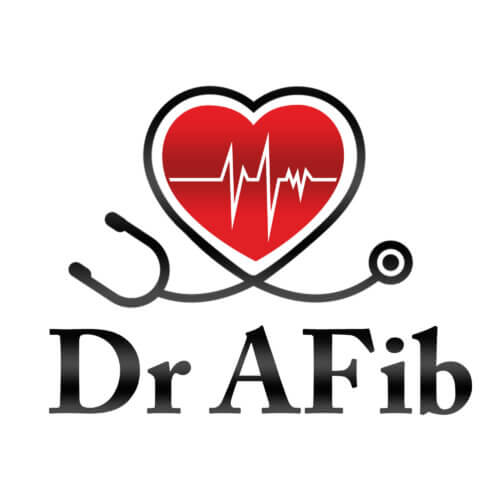
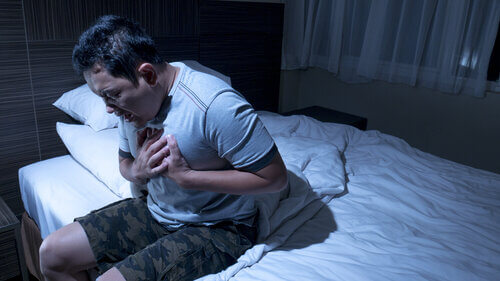














![Apple Watch Series 9 [GPS 41mm] Smartwatch with Storm Blue Aluminum Case with Silver Sport Band M/L. Fitness Tracker, Blood Oxygen & ECG Apps, Always-On Retina Display #1](https://m.media-amazon.com/images/I/311xwtp4mFL._SL100_.jpg)
![Apple Watch Series 9 [GPS 41mm] Smartwatch with Storm Blue Aluminum Case with Silver Sport Band M/L. Fitness Tracker, Blood Oxygen & ECG Apps, Always-On Retina Display #2](https://m.media-amazon.com/images/I/41j+8AaUGsL._SL100_.jpg)
![Apple Watch Series 9 [GPS 41mm] Smartwatch with Storm Blue Aluminum Case with Silver Sport Band M/L. Fitness Tracker, Blood Oxygen & ECG Apps, Always-On Retina Display #3](https://m.media-amazon.com/images/I/41jIyxZitnL._SL100_.jpg)
![Apple Watch Series 9 [GPS 41mm] Smartwatch with Storm Blue Aluminum Case with Silver Sport Band M/L. Fitness Tracker, Blood Oxygen & ECG Apps, Always-On Retina Display #4](https://m.media-amazon.com/images/I/41IpNJERjCL._SL100_.jpg)
![Apple Watch Series 9 [GPS 41mm] Smartwatch with Storm Blue Aluminum Case with Silver Sport Band M/L. Fitness Tracker, Blood Oxygen & ECG Apps, Always-On Retina Display #5](https://m.media-amazon.com/images/I/31o17yhfYpL._SL100_.jpg)





























